- Home
- Brian Garfield
Marshal Jeremy Six #4 the Proud Riders Page 12
Marshal Jeremy Six #4 the Proud Riders Read online
Page 12
“I hope you do, pally.”
Paradise nodded briskly, rode around the little jockey, and headed into town.
Connie brought her husband into Spanish Flat early on the morning of July Fourth. He lay in the back of a wagon, wedged into mattresses and propped on down pillows. At the hotel, which stood at the corner of Center Street, she stopped the wagon and got down. Two men helped Chavis off the tailgate and he smiled apologetically. “I’m not supposed to jar anything loose just now.”
“Sure, Tracy,” said one of the men. “You just take it easy.”
Jeremy Six came along the walk. It didn’t miss Chavis’ attention that Six was wearing two guns this morning—a highly unusual practice for the marshal.
Connie greeted Six, and Chavis said, “You’re carrying as much armament as a gunboat.”
“Just trying to impress the townsfolk.” Six was trying to dismiss it with a joke, but Chavis didn’t buy it. Still, he said nothing further about it.
He went up onto the porch, arms over the two cowboys’ shoulders. Connie said, “Would you boys mind helping us upstairs? We’ve taken the corner room so that Tracy can watch the race from the windows.”
Six said, “How’re you making it, Tracy?”
“I’ll be fine,” Chavis said gruffly. “Just takes a little time to heal up, is all.”
Six said softly, “All the luck in the world with this horse race, feller.”
“Who said I ever needed luck?”
You’ll need it this time, Six thought. But he said, “Sure. Well, make yourself comfortable up there. I’ll be up to see you when I get a chance.”
Connie smiled at him and turned to follow the others into the hotel. Six stood on the porch, teetering on the balls of his feet, looking down both streets visible from here on the corner: down the main street he could see the crowd, already starting to gather at the cross rope of the finish line. And, to his left a block down Center Street, he could see the front of the Wells Fargo office.
From scattered quarters of town came the sporadic popping of firecrackers and skyrockets. Sometime today, if things went true to form, Six would have to arrest half a dozen kids for malicious mischief, and the doctor would be treating one or two of them for burned faces and hands. Kids had a way of letting firecrackers blow up in their faces. Two years ago one of the children had put out one eye. Three kids in town sported shortened fingers where homemade fireworks had blown off a knuckle or two.
But there was no stopping it, and perhaps no desire to. It was still a raw frontier country, and it was far better to let them blow off steam with fireworks than to wait for them to grow up and turn into—turn into John Paradises, he thought seeing the wiry little gunfighter walk out of the stable leading Chavis’ palomino stallion.
Paradise seemed to know where to look. He lifted his head toward the upstairs windows of the hotel, grinned and waved his hand. Six glanced upward, and saw a hand waggling within the parted curtains.
Firecrackers sputtered and crackled, several blocks away. Just beyond the Drover’s Rest, the side street was blocked off by a big ribbon-draped speakers’ stand. There would be speeches and toasts later in the day, capped by a box-supper social at the schoolhouse. But the morning’s entertainment was fare for the men: the horse race. Six took out his big snap-lid pocket watch and glanced at it. Eight-thirty. The race would be starting in an hour.
Up-street he saw Paradise mount the palomino and ride it out of town to limber it up before the race. Jay Macquarie came out of the stable, leading Rose’s sorrel. Mr. Clete was with him, talking angrily, but Macquarie paid him no attention. In the upstairs hotel window, beside Chavis’ corner suite, Harry Rose bulked for a moment, frowning down, then he retreated from sight.
Hal Craycroft came down the walk, stiff in a high collar and cravat and black hat. He was grinning broadly, inspired by the heady spirit of the holiday. The back-street hitch rails were jamming up with horses; the town quickly began to fill with incoming cowboys and ranchers, miners, hill hunters and prospectors and farmers and drifters. Since it was a holiday, all the commercial travelers who happened to be in town set themselves up on the porch of Mrs. Murphy’s boarding house and played checkers and whist, and awaited the horse race.
Ladies in bright-hued costumes cruised the walks, twirling parasols over their shoulders. Men dressed in their best Sunday finery told hearty jokes to one another and began to group against the crowd-ropes that cordoned off the main street, where the big race was to be commenced and climaxed.
Chunky and confident, Ben Chandler came out of the hotel with a nod and a grin for Jeremy Six; Chandler dropped off the walk, ducked under the rope and walked catty-corner to the opposite walk, heading for the stables to saddle his big black horse.
The other ranchers had congregated down there at the stable, and while the seven or eight race-entries came out one by one and paraded back and forth before trotting out of town to warm up, the crowd of kibitzers stood around giving the horses last-minute critical examinations.
Hal Craycroft was down there, busily collecting wagers and making entries in his pocket notebook. There was a spirit of high cheer in the air. The sun was bright, the sky was crystal clear, and at this early hour the oppressive heat had yet to arrive.
For the second time that morning, Jeremy Six walked down Center Street as far as the gun shop, turned casually inside and walked across the shop to the door at the side of the room. He rapped three times, said, “Six” and opened the door.
Dominguez sat sleepily by the window, feet propped up and shotgun across his lap. Bill Dealing, the town’s night marshal (a misnomer, since his hours were 3 a.m. to 3 p.m.), lay curled on a mattress in the front corner of the room.
Six lifted his eyebrows and Dominguez said quietly, “Calm as a horse trough.”
“Let’s hope it stays that way.”
Bill Dealing began to stir and Six said, “Better wake him up. The race will start in forty-five minutes and if anybody’s a mind to rob the Wells Fargo office, they might pick just that time to do it. Hoping the confusion will cover the robbery.”
Dealing grumbled and ground knuckles into his eye sockets. “I’m awake,” he muttered. “God, I feel like we’ve been buried alive in here for three days.”
“Won’t be too much longer,” Six told him. “The army boys will start showing up tomorrow to pick up the payroll.”
“That won’t be any too soon for me,” Dealing replied.
“Sorry you boys have to miss the race,” Six said. He backed out of the room and pulled the door shut, and went back up the street toward the center of town. A casual glance both ways indicated that no one seemed to have seen him go into the gun shop or come out again.
At the corner by the hotel he almost bumped into big Mr. Clete. Clete gave him an expressionless look and went on inside. Six crossed the street, ducking the ropes, and met Hal Craycroft on the far walk. Thick pedestrian traffic flowed past. People were beginning to take their places along the ropes. More enterprising spectators had climbed to building roofs.
Craycroft said, “I’m holding almost six thousand dollars in side bets. And that don’t count all the private betting that’s going on. This damn race has attracted a hell of a lot of attention for a town this size.”
Six nodded. “Seen the Lockharts around, Hal?”
Craycroft thought about it. “Now you mention it, no. I ain’t seen any of them since last night.”
“All right. Thanks.” Six went on down the walk, threading a path through the swirling crowds.
He made a swift circuit of the town, stopping briefly at the Glad Hand. The place was completely deserted except for its owner: Clarissa sat on the piano bench, picking out a tune with one finger on the keys.
Six said, “You’re missing the fun.”
“The good ladies in town wouldn’t appreciate it if I took up a front-row place to watch,” she said. “Never mind, Jeremy.”
“I thought you liked racing.”
&
nbsp; “Sure. But not enough to get somebody’s husband in trouble.” She gave him a weary, stoic smile.
“No,” he said, “I guess I won’t let you get away with that. Come on, I’ve got just the place for you.” He took her by the hand.
She didn’t object. Her smile was wistful and agreeable. Six led her up through the tangled streets of Cat Town, listening to the voice-rumble of the crowd up ahead and the occasional banging of firecrackers on the outskirts of town; he brought her up Center Street from the west, led her through the crowd and across the intersection to the hotel. People parted to let them through. If anyone had harsh thoughts about the marshal and the Cat Town saloon mistress traveling the streets together, no one spoke: the town owed Jeremy Six too much to quarrel with him over such a small matter. The truth was that Clarissa had made her peace with the ladies of Spanish Flat; and, specifically, it had been Six who had made her peace with them.
He took her into the hotel, up the stairs and along the corridor to the front corner room. When Connie opened the door, Six ushered Clarissa inside ahead of him. He said, “How about a space for the lady, Connie?”
Surprised but not offended, Connie grinned. “Of course. Come in, Miss Vane. We’re glad to have you.”
Clarissa’s face colored. “Thank you. I really didn’t expect—”
“Nonsense,” Connie said.
Tracy Chavis was propped in a pillow-stuffed chair near the corner where he could see out through both of the corner windows without shifting his seat. Merely by turning his head he had a view of the main street in both directions and the first two blocks back along Center Street, past the Wells Fargo office.
Looking around casually, Chavis said, “Morning, Clarissa. Make yourself at home.”
“Why, thanks, Tracy.” Clarissa glanced at Connie. It was evident that Connie was very sure of her husband, very much in love with him. If she had not been, she would have resented Clarissa’s intrusion, as all the town’s ladies resented her. But there was none of that in Connie’s welcome: it was completely free of distrust.
Connie said, “If we stand right behind Tracy’s chair we’ll have a good view of the whole thing.”
“This is very good of you both,” Clarissa said.
“Don’t be silly.”
Clarissa smiled. “I think what makes most of the other women hate me is that I’m not ashamed of myself. But you almost make me begin to wonder.”
Six cleared his throat; he felt uncomfortable in the midst of woman-talk. He said, “I’d better get back down there.” Chavis said, “Come on up after the race and we’ll celebrate my victory. Mine and John Paradise’s.”
I hope there’ll be something to celebrate, Six thought moodily. But he said, “Sure, Tracy,” and bowed himself out of the room.
Chapter Thirteen
Up in his second-story window, Tracy Chavis had a good view of most of the events of that explosive Fourth of July morning.
It started out innocuously enough. He grinned and said, “Pretty soft, bundled up here on down pillows and being waited on hand-and-foot by the two most beautiful women in the Territory.”
Connie gave Clarissa Vane an amused look, glanced down through the window and said, “Oh, look. There’s John now. They must be getting ready to start the race.” Chavis turned and settled himself down to watch the doings at the starting line. He heard Clarissa ask about little Peggy, heard Connie’s laugh and heard her explain that Peggy’s runny-nose and head cold had kept the littlest Chavis at home with Señora Gutierrez. Chavis thought he detected a note of faraway regret in Clarissa’s voice when she asked about the child.
Down below, John Paradise was walking the big palomino up to the starting-line. Chavis said, “You know, we ought to give that horse a name.”
Connie said, “Maybe we’d better wait until we see how he does in the race.”
“He’ll win it,” Chavis said. “He’s got to.” He felt the pressure of her hand on his shoulder.
Chandler and Macquarie rode up beside Paradise; the others came in, straggling gradually forward and easing into a line ten-abreast across the street. Hal Craycroft stood with a blank-cartridge revolver in his fist, talking to the mayor, who was also one of the judges of the race. The three judges stood at the finish-line marker, looking stuffy and self-important; but, Chavis knew, they were all good men and would render honest judgments if the race proved a close one.
It was a line of handsome animals, all of them groomed and brushed to a sheen. Every conceivable coloring of horse was in evidence, from Morley’s spunky little spotted appaloosa to Chandler’s big coal-black stallion, Rose’s tall sorrel and Chavis’ own deep-chested palomino. He thought: It may be prejudice but I do believe that palomino’s the best-looking one of the lot.
But then, he thought drily, looks don’t win races. Still, maybe it was a good sign. It had better be. Lose this race and I’m back to cowboying for dollar wages. He wouldn’t have minded for himself, but it was hard to raise a family on thirty-a-month and-found.
Down on the starting line, Craycroft consulted his watch, spoke to the mayor, and lifted his starting-gun. He raised his voice and called out to the ten riders, and Chavis watched them bring their handsome prancing animals into line.
Jeremy Six was down there, talking with the mayor and Craycroft. Astride the palomino, John Paradise put the reins in his teeth and lifted his hat toward Chavis’ window. Chavis grinned. Paradise jammed his hat down and adjusted the reins in his fingers. Paradise was wearing his gun, Chavis noted. Right beside Paradise, little Jay Macquarie said something that made Paradise smile.
The jockey from the East was wearing racing silks—a metallic green blouse over tight brown trousers; a billed green cap shaded his eyes. He was a strange sight amid the row of cowboy-hatted riders. All the saddles had been stripped down to basics. Still, Macquarie’s was by far the lightest saddle of the lot, and Macquarie was the lightest rider. But, as Paradise had pointed out to Chavis, Macquarie didn’t have more than a ten pound advantage over him. Chavis thought, I did the right thing, letting him ride for me.
He saw Paradise say something to Jeremy Six, in response to which Six frowned and snapped off a thin-lipped comment. That was something Chavis regretted. He had known Paradise a long time and knew that there was a lot of good in the man. Both Paradise and Six were his friends, and he wished they could have liked each other.
He thought, suddenly, Where’s Harry Rose? Rose owned the big sorrel that Macquarie was riding. You’d have thought the fat man would have been right down there at the starting line, but no, he was nowhere in sight. That was strange, but it passed quickly through Chavis’ mind. There was no time to worry about things like that.
Hal Craycroft’s finger grew visibly white on the trigger. His eyes were fixed on his watch. Unconsciously, Chavis leaned forward in his chair.
The pressure of Connie’s hand eased him back. He started to grumble a complaint, but it was cut off by the roar of the starter’s pistol.
Smoke puffed from Craycroft’s gun. Eyes pinned on the street, Chavis watched the race start.
The sorrel, bred all its life to racing, responded instantly to the gun: it broke from a dead stop into a full-gaited gallop, leaving the entire field behind.
The other horses milled around in disorganized confusion. Chavis heard lusty curses; there was a roar of encouragement from the crowded sidelines. Moreley’s appaloosa darted out of the melee, four lengths behind Macquarie, and right behind the appaloosa came Chandler’s black. Then the others broke across the line in a bunch.
Horrified, Chavis saw that the palomino was the last in line. My God, he thought. The damned horse is gun shy. Never had a shot fired in his ear before.
He felt the vise-grip of Connie’s hand on his shoulder. He saw the palomino wheel around in a nervous circle, saw Paradise grimly fight it down, sink heels into its flanks, urge it forward with earnest fervor. When the palomino finally broke into a gallop, the rest of the field was twenty yards i
nto the open, and Macquarie on the big sorrel had a fifteen-length lead or more.
Macquarie’s green silk colors flashed by the open window, directly below the hotel. The field thundered past, like hounds baying after the thoroughbred; and, finally, the big palomino came drumming along. Chavis watched with his heart in his throat. Why in hell don’t you whip him up? He cried aloud: “Give him the spurs, for God’s sake!”
Connie said, “Take it easy, darling.”
“But he’s not even trying to get speed out of that horse!”
“John knows what he’s doing. We’ve got to trust him.” Clarissa said, “He’s got six miles to go, Tracy. He can’t wear the horse out in the first hundred yards.”
He said gloomily, “I guess you’re right.” He leaned forward in the chair to look through the window at an angle, and watched the horses disappear to the north. The palomino was still bringing up the rear.
And then they were gone from sight. The crowd settled down to a nervous, fidgety wait. Chavis sank back in his chair, feeling dark and sour. He said bitterly, “We should have trained that horse to gunfire.”
“You didn’t have time for everything,” Connie said.
Clarissa came forward and touched his other arm. “It will be all right, Tracy. It’s still a long way to the finish.” Down below, he saw Jeremy Six walking up the street from the starting line. Six was not making a spectacle of himself, but it was evident that he was in a considerable hurry to reach the corner. Not fathoming that, Chavis glanced idly to his left down Center Street toward the Wells Fargo office—and sat bolt upright in the chair.
What he said was, “Get me my gun, Connie. Quick!”
Chapter Fourteen
The same sight that aroused Chavis also brought Jeremy Six up on his toes. Rounding the corner into Center Street, he saw three rangy redheaded men swarming boldly up the walk and barging into the Wells Fargo office with their guns up. The last of the three—it looked like Seth—waited by the door, holding the reins of the three horses.

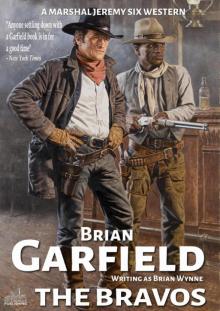 Marshal Jeremy Six #3
Marshal Jeremy Six #3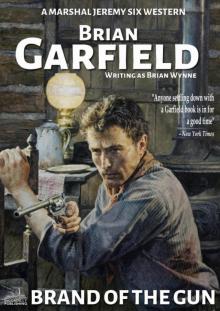 Marshal Jeremy Six #6
Marshal Jeremy Six #6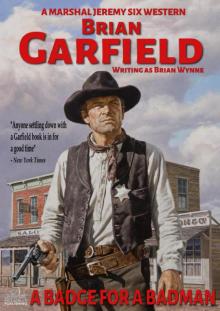 Marshal Jeremy Six #5
Marshal Jeremy Six #5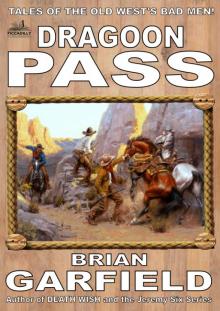 The Outlaws 2
The Outlaws 2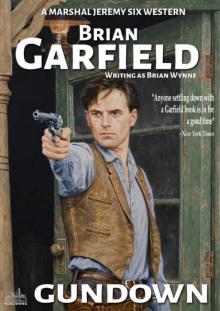 Marshal Jeremy Six #7
Marshal Jeremy Six #7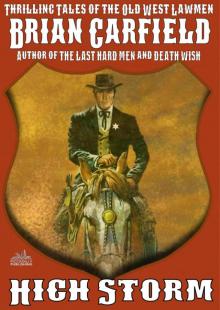 The Lawbringers 4
The Lawbringers 4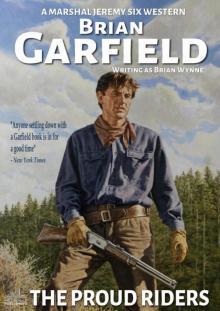 Marshal Jeremy Six #4 the Proud Riders
Marshal Jeremy Six #4 the Proud Riders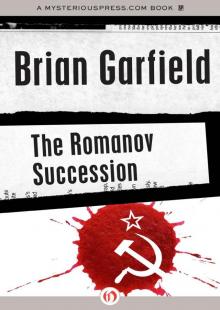 The Romanov succession
The Romanov succession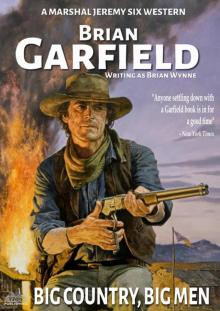 Marshal Jeremy Six #8
Marshal Jeremy Six #8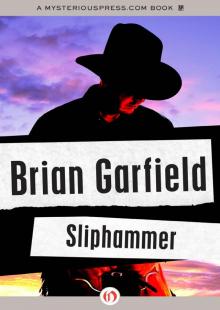 Sliphammer
Sliphammer Line of Succession
Line of Succession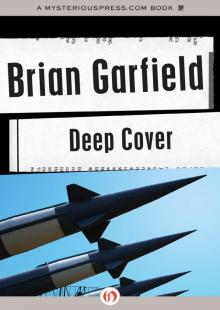 Deep Cover
Deep Cover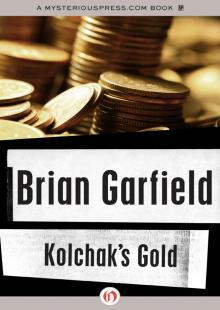 Kolchak's Gold
Kolchak's Gold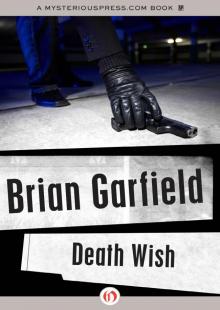 Death Wish
Death Wish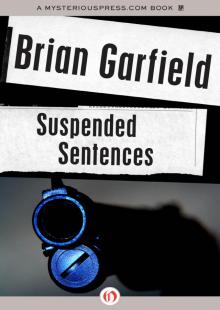 Suspended Sentences
Suspended Sentences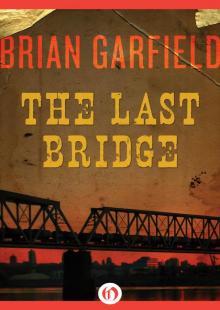 The Last Bridge
The Last Bridge Relentless
Relentless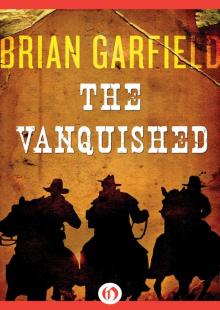 The Vanquished
The Vanquished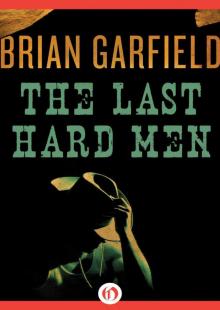 The Last Hard Men
The Last Hard Men Hit and The Marksman
Hit and The Marksman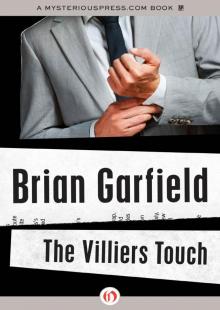 Villiers Touch
Villiers Touch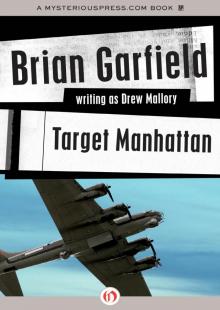 Target Manhattan
Target Manhattan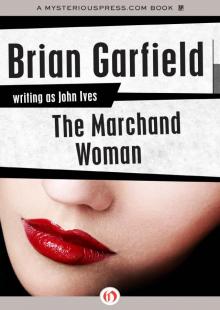 Marchand Woman
Marchand Woman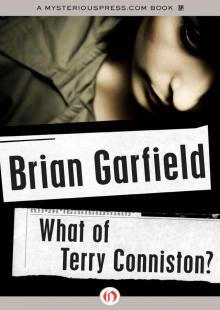 What of Terry Conniston?
What of Terry Conniston?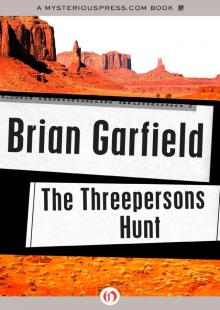 Threepersons Hunt
Threepersons Hunt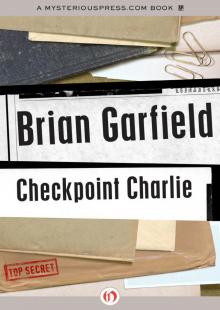 Checkpoint Charlie
Checkpoint Charlie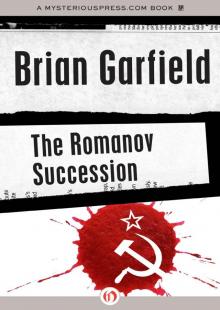 Romanov Succession
Romanov Succession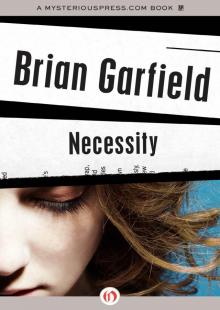 Necessity
Necessity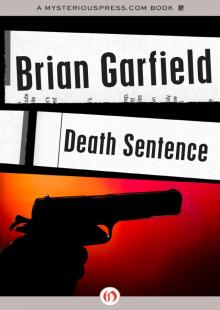 Death Sentence
Death Sentence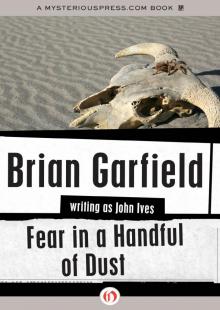 Fear in a Handful of Dust
Fear in a Handful of Dust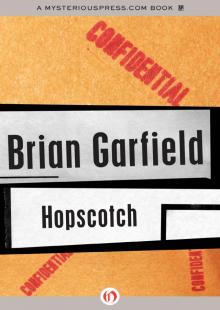 Hopscotch
Hopscotch